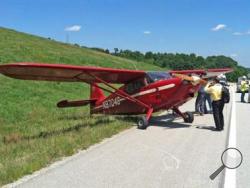Pilot billed $3,000 for landing on Pa. toll road
Posted: November 19, 2013 - 4:09am
CENTERVILLE, Pa. (AP) -- The pilot of a small vintage plane who made an emergency landing on a western Pennsylvania toll road has been billed nearly $3,000 by the Pennsylvania Turnpike Commission, over and above $1,000 he initially paid for the plane to be towed from the scene.
Brian Nicholson, of Upper Speers, believes much of the bill is unnecessary because he had a mechanic prepared to replace the plane's damaged propeller so he could fly away.
"I find this appalling," Nicholson told the Pittsburgh Tribune-Review (http://bit.ly/1b3iV4G ). "We're trained as pilots to make a decision in emergency situations and not to second-guess those decisions."
Nicholson landed on the Mon-Fayette Expressway about 11 a.m. Aug. 5, a Monday, when a chunk of the wooden propeller broke off the 1946 Universal Stinson airplane he was flying with a friend. The friend is also a pilot and teaches school with Nicholson and nearby Brownsville High School.
Nicholson dodged electric power lines and highway signs, and landed between a car and a tractor-trailer. "We didn't damage the highway, any vehicles or the plane," Nicholson said.
Nicholson contends he summoned a mechanic who could have replaced the propeller in minutes, enabling him to take off from the road. But he said turnpike officials wouldn't let him touch the plane. After charging him $1,000 to tow the plane from the scene, he later got a bill for $2,993.34 to cover the labor of workers used to remove the plane from the road, Nicholson said.
The turnpike commission issued a statement saying the decision to prevent Nicholson from taking off again was made due to "customer safety" and because it would have cost more money to close the road in both directions to allow for the takeoff.
"It is standard practice for the turnpike to seek reparations after an incident that necessitates involvement of our personnel. How we're handling this is no different than how we handle similar accidents involving a car or truck, and it's comparable to processes used by other highway operators," the commission said in a statement.
Nicholson thinks that's wrong because the situation was "an emergency, and someone was going to die if the right decision wasn't made."

